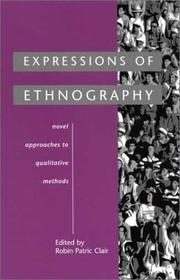| Listing 1 - 4 of 4 |
Sort by
|

ISBN: 079148632X 1417536187 9781417536184 0791458237 9780791458235 0791458245 9780791458242 9780791486320 Year: 2003 Publisher: Albany, NY : State University of New York Press,
Abstract | Keywords | Export | Availability | Bookmark
 Loading...
Loading...Choose an application
- Reference Manager
- EndNote
- RefWorks (Direct export to RefWorks)
A different approach to contemporary ethnography, embracing the idea that alternative genres may be used to express cultural experience.
Ethnology --- Qualitative ethnological research --- Qualitative research --- Qualitative research. --- Methodology. --- Research --- Methodology --- Research. --- Qualitative analysis (Research) --- Qualitative methods (Research)

ISBN: 0585087709 9780585087702 0791439410 0791439429 0791499170 9780791499177 Year: 1998 Publisher: Albany, N.Y. State University of New York Press
Abstract | Keywords | Export | Availability | Bookmark
 Loading...
Loading...Choose an application
- Reference Manager
- EndNote
- RefWorks (Direct export to RefWorks)
Organizing Silence is a thought-provoking look at how silence is embedded in our language, society, and institutions. It provides an overview of the varied philosophical approaches to understanding the role of silence and communication. One particular view of silence/communication, as grounded in political and patriarchal frameworks, is given special attention. The author questions not only how dominant groups silence marginalized members of society, but also how marginalized groups privilege and abandon each other.
Silence. --- Communication. --- Sexual harassment. --- Communication in organizations. --- Resistance (Psychoanalysis) --- Aesthetics. --- Beautiful, The --- Beauty --- Esthetics --- Taste (Aesthetics) --- Philosophy --- Art --- Criticism --- Literature --- Proportion --- Symmetry --- Defense mechanisms (Psychology) --- Psychoanalysis --- Psychotherapy --- Organizational communication --- Organization --- Sexual harassment in the workplace --- Workplace sexual harassment --- Harassment --- Sex role in the work environment --- Communication, Primitive --- Mass communication --- Sociology --- Noise --- Psychology --- Aesthetics --- Communication --- Communication in organizations --- Sexual harassment --- Silence --- Resistance (Psychoanalysis). --- Radio broadcasting Aesthetics
Book
ISBN: 9789462093089 9789462093072 9462093083 9462093067 9789462093065 9462093075 9789462093065 Year: 2013 Publisher: Rotterdam
Abstract | Keywords | Export | Availability | Bookmark
 Loading...
Loading...Choose an application
- Reference Manager
- EndNote
- RefWorks (Direct export to RefWorks)
Professor Delta Quinn teams with investigative reporter Caleb Barthes to unravel the mystery of the zombie seed, the genetically-modified follow-up to the “terminator seed.” This fact-based fiction is an academic novel that relies on fast-paced action as well as theoretical insights. Using the cultural icon of the zombie to address work alienation and contemporary apathy is perfect for the purposes of having the reader examine corporate greed in a global world. The cast of characters brings this global aspect to life. In the backdrop of the novel, a history of the zombie unfolds—a history of the violence that Haiti and African diaspora have suffered. Yet, it is Delta’s research into narratives of partner abuse that lead her to grapple with her own tragic past and take brave steps toward ending the abuse of others. This social justice book is based on award-winning research in rhetorical ethnography and is being assigned for courses in rhetoric, ethnography, narrative, organizational communication, and diversity, but would fit with others (e.g., ethics, interpersonal, public relations, journalism, sociology, philosophy) where examining the individual’s role in the life-world is not only promoted but expected. If the novel doesn’t do it, then the facts found at the end of the book should “wake up” any remaining zombies. Robin Patric Clair is a Full Professor, Diversity Fellow and a Fellow to the Center of Creative Endeavors at Purdue University. She has won research awards in rhetoric, narrative, ethnography and organizational communication, including two ‘Outstanding Book of the Year’ awards, two ‘Best Research Article of the Year’ awards, the ‘Golden Anniversary Award’ and multiple ‘Top Paper’ Awards for her research.
Teaching --- diaspora --- onderwijs --- Haiti --- Education. --- Education, general. --- Children --- Education, Primitive --- Education of children --- Human resource development --- Instruction --- Pedagogy --- Schooling --- Students --- Youth --- Civilization --- Learning and scholarship --- Mental discipline --- Schools --- Training --- Education
Book
ISBN: 9004446257 Year: 2021 Publisher: Leiden ; Boston : Brill Sense,
Abstract | Keywords | Export | Availability | Bookmark
 Loading...
Loading...Choose an application
- Reference Manager
- EndNote
- RefWorks (Direct export to RefWorks)
"Blood into Water: A Case of Social Justice is a novel that weaves together the past and the present, from Mayan legends to contemporary stories of corporate greed. The story connects a mother and son, Sofia and Miguel Rodríguez, to a corporate scheme of exploitation uncovered by reporter Caleb Barthes. Barthes is sent to Nicaragua on an investigative assignment to look into water privatization plans. He learns far more than he expects about the environmental, political, and cultural issues surrounding 'water.' Perhaps more importantly, he learns about postcolonial exploitation and his own complicity, as well as the loss that can follow, not only for himself, but others. This novel, inspired by the Bolivian Water Wars, offers students a creative text dealing with an environmental issue that leads to a social movement. Anthropologists, archaeologists, historians, rhetoricians, sociologists, psychologists, political scientists, as well as scholars of business, organizational communication, interpersonal communication, cultural studies and environmental studies will easily find a place in the curriculum for this novel"--
Environmental justice --- Environmental justice. --- Nicaragua
| Listing 1 - 4 of 4 |
Sort by
|

 Search
Search Feedback
Feedback About UniCat
About UniCat  Help
Help News
News